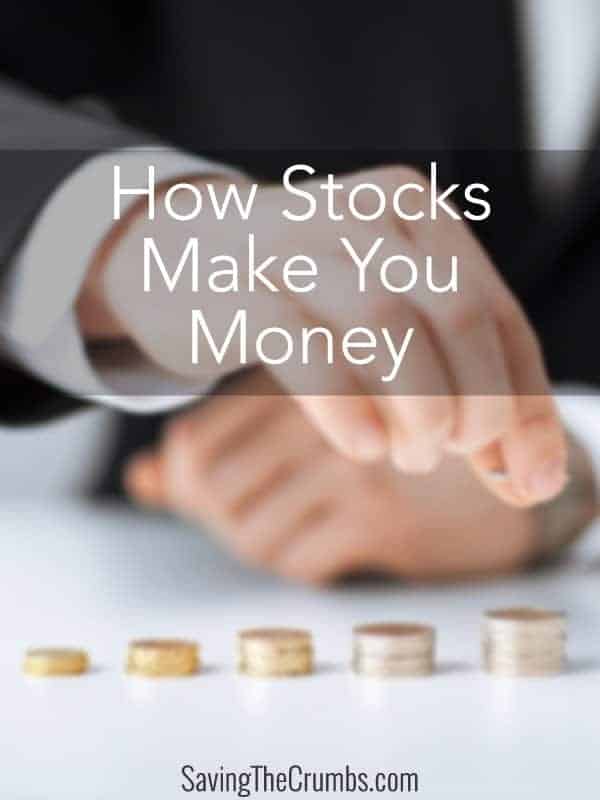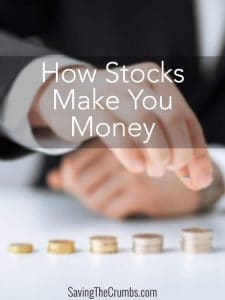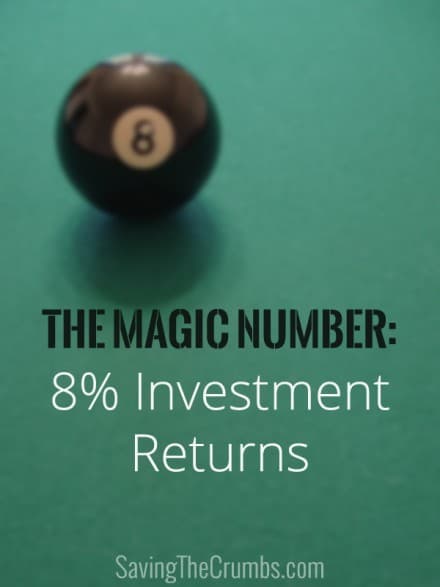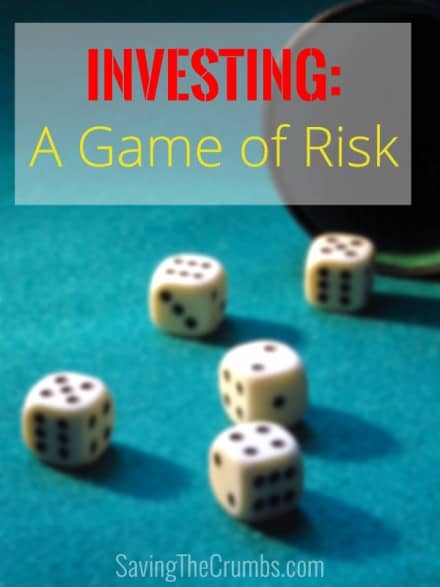Wait! Before you write this post off as one of those spammy, click-baiting, “get-rich-quick” articles that show up in annoying pop-up windows, notice that this article isn’t called “How to Make Tons of Money in the Stock Market”. In fact, the burden of this article isn’t even to convince you to buy stocks! So please, hear me out.
In my discussions with people on personal finance, it’s become clear that there is widespread misunderstanding (ignorance?) about stocks—what they are, how they work, and whether they’re “good” or “bad.” So consider this post a tutorial to help dispel some myths, offer some definitions—and hopefully—simplify what seems to be a rather complicated subject. It is my intent that this will be beneficial to you, as a piece of practical knowledge, whether you choose to invest in stocks or not. Let’s go!
A Professor Gets It Wrong
When I was in college, a student asked one of the professors to explain what stocks were. The teacher took a piece of paper and handed it to a student. He then asked another student, how much she would be willing to pay for that that piece of paper. When the student hesitated, the teacher prompted her to just make up a number. He then asked another student to pick a different amount he would be willing to pay. Then he asked the student holding the piece of paper, which of the two bidders he would be willing to sell the paper to. He obviously picked the higher bidder. Then the teacher announced, “That’s how stocks work!”
Ummm…not exactly.
To his defense, this teacher did not teach business finance or investing. His area of expertise was something much different and unrelated. Nevertheless, I believe his response is illustrative of the common misperception that many people, even highly intelligent ones, have about stocks:
- They are just nothing more than meaningless pieces of paper (or digital bits of data).
- They are assigned arbitrary values unhinged from reality.
- Trading stocks is nothing more than a bidding war on these arbitrary pieces of paper.
- The stock market is just a giant casino where people try their luck on buying a piece of paper for less than what they might be able to sell it for to someone else.
Does this sound like your understanding of stocks? Well, you’re not alone. This is what I thought too for a long time.
What Stocks Really Are
Stocks aren’t just pieces of paper. In actuality, they represent ownership in a business.
Imagine you are the sole owner of a health food store called “Healthy Provender” (healthyprovender.com is still available, btw). Congratulations! You are a stockholder! Because you are the only owner, you own 100% of the stock in that business. (Other terminology that’s synonymous to “stock” includes, “shares” and “equity”.)
If the balance sheet of Healthy Provender in 2014 showed that the company was worth $250,000, then the value of your share was also $250,000. This is the minimum value that someone should theoretically pay if they wanted to buy your business. (This is oversimplified for sake of illustration.) If in 2015, the company’s worth increased to $500,000, then your share has gone up 100%. You’ve earned money (on paper, at least) because the amount someone would need to pay to buy the business from you has doubled. This increase in the value of your investment is called capital appreciation.
If Healthy Provender earns a net profit of $50,000 through its sales, the company has two options: 1) reinvest those funds back into the business and thereby increasing its value, or 2) distribute that money to the owner(s). If the money is paid out to you as the stockholder, this disbursement is called a dividend.
There you have it, as the owner of Healthy Provender, you own 100% of the company stock and you make money two ways from this business: You earn through the increase of the value of the business (capital appreciation) and you earn by getting back your portion of the profits generated by the business (dividends). No gambling or shady-business required!
Multiplying It Out
Now suppose that you own Healthy Provender equally with your brother, that means each of your stock is worth 50% of the value of the business, and you are entitled to 50% of whatever dividends are paid out from the business.
Make sense so far? Now imagine that the number of owners grow from 2 to 10 to 100 to 1000 to 1,000,000. What happens to the shares in the business? They just continue getting divided into smaller equal portions, and each portion is entitled to its proportion of the value of the business as well as its profits. If the business makes $1,000,000 net profit and has 1,000,000 shareholders, each of them is entitled to $1. Most companies that you hear about like Apple and Wal-Mart have millions of such owners.
Why Have So Many Owners?
If you’re like me, you’re probably wondering why anyone would want to divide out ownership of a good business across thousands or millions of owners since that simply dilutes any of the earnings.
Well, the reality is that most businesses don’t grow out of thin air. They require upfront capital and/or sweat equity to jumpstart the enterprise and often need continued injection of cash to keep it going. (If you’ve ever watched the TV show, Shark Tank, you’ll know what I’m talking about.) The investors who front that capital need to be remunerated for the risk they’re taking with their money, and one way that happens is by being awarded share in the company. That way, they get paid if the company’s value appreciates and also through dividends that are disbursed. Founders and inventors often get share in a business, even if they don’t provide cash, because they bring value to the enterprise by coming up with the brilliant idea and/or bringing essential skills to pull the business off.
What About the Stock Market?
Has it been curious to you why the stock market hasn’t been mentioned at all so far in this discussion on stocks? The reason is that the stock market isn’t really all that important. The stock market—or more accurately, the stock exchanges—is simply a secondary marketplace for people to transfer their business ownership around to other people. They’re just people trading with one another, usually without even the business being traded involved—thus the term, “stock trading”. Apart from an initial public offering or a reissuance of more shares to raise capital, pretty much none of the money and stock transfers on stock exchanges like the New York Stock Exchange actually goes to the companies at all. Moreover, only publicly traded companies are available on the stock market and most businesses are privately held.
The theory is that the natural forces in the marketplace should impute a fair value on all of those stocks as people buy and sell their portions of ownership rights on the exchanges. While this may be true over time, we know that doesn’t always happen on the short-term since the stock markets rise and fall—sometimes impressively irrationally. That price movement only matters at the moment of buying or selling, but to owners of businesses, all that hubbub shouldn’t matter much at all because the value of the stock isn’t necessarily determined by the market but by the fundamental health and performance of the underlying business.
For example, say on Monday someone offers to buy Healthy Provender from you for $250,000. Then on Tuesday, someone offers to buy it for $100,000. Then on Wednesday, someone offers to buy it for $300,000. Why does it matter if you’re not interested in selling? That’s like what happens on the stock market: Random price offers for you to sell your share. But as a business owner, you realize that the true worth of your stock is in the actual value of the company (as reflected in its balance sheet, not the whims of the market) and the profits that it generates.
Another example is your home. You pay close attention to the price the market places upon your home when you are interested in buying or selling it. But few people care to know what the current going rate is on their house while they’re living in it.
Day-traders in the stock market try to exploit the price action of stocks, but stock investors buy stocks in order to buy good businesses. There is a world of difference between these two ways of thinking. One is speculation, while the other is investing. I won’t dwell anymore on this discussion now since I’ve written a post that deals with this subject in the past: Of Speculating, Investing, and Tulips.
The Risks
As we’ve discussed before, there’s no such thing as a risk-free investment. So naturally, there are risks in stock ownership. As you can probably imagine, those risks are largely the same as the risks of owning any business: They can lose money, and they can go out of business. Buyer beware!*
A Concrete Example
All right, so how about an actual example from real life?
Warren Buffett is considered one of the, if not the, greatest investor who ever lived. One of his most famous investments was in Coca-Cola. (Disclaimer: This is not an endorsement to buy Coca-Cola stock, since Coke products probably won’t make it onto shelves at Healthy Provender. This is just an example from history.) In 1994, he bought approximately $750 million of stock in Coke. If you compare the historical prices of the stock, you can deduce that in 2015 today, those shares have appreciated to around $3 billion.
That’s not a small sum of money, but the stock price doesn’t even tell the full story because Warren has also been collecting dividends ever since then.
In a letter to shareholders of his company Berkshire Hathaway in 2011, he wrote the following:
Coca-Cola paid us $88 million in 1995, the year after we finished purchasing the stock. Every year since, Coke has increased its dividend. In 2011, we will almost certainly receive $376 million from Coke, up $24 million from last year. Within ten years, I would expect that $376 million to double. By the end of that period, I wouldn’t be surprised to see our share of Coke’s annual earnings exceed 100% of what we paid for the investment.
In other words, because Coca-Cola’s business did so well in the years since his initial investment, the dividends paid out to shareholders have increased every year. So much so that by 2021, Warren believes the dividends paid EACH YEAR will be more than the $750 million he originally paid to buy the stock.
Warren didn’t become the greatest investor by “playing the stock market” and trading in and out of it. He simply understood how businesses worked, had an uncanny ability to pick companies that were successful, bought plenty of equity in those businesses, and then had the patience to hold on to them for decades. He could well have ignored the entire stock market for all those years and it wouldn’t have affected the outcome one penny.
Good, Bad, or Something Else?
So are stocks good or bad? I hope it’s clear that there is no immorality with stock ownership in and of itself. It’s no different than being an owner of your own business. But there are some tangential aspects of stocks that could be bad.
- Ignorance is bad. A lot of people buy stocks based on some fad, or emotion, or advice from some equally ignorant friend. Also, ignorance in how stocks work leads people to throw money around in the stock marketing, thinking that’s how it’s done and wishing for some gain. Investing in something we don’t understand is one of the guaranteed ways to lose money.
- Greed and speculation are bad. Innately in human nature is the desire for great gain with little effort, thus the inexorable appeal of lotteries and gambling. I find that even a lot of otherwise upright and well-meaning people approach stock investing with the mindset of wanting to get rich quick. Couple that with the ignorance we just spoke about and we have a potent combination.
- Immoral businesses are bad. While the practice of owning a business might not be immoral, a business may be engaged in immoral activities. Different people may have different standards for morality for businesses, but some examples of categories of immoral businesses may include: gambling, pornography, tobacco, alcohol, weapons manufacturing, etc.
- Even good businesses can be risky. We all know of good businesses that have closed. So investing in any individual business (including your own!), no matter how good you think it is, can be considered high risk. Because of this, my personal preference is to invest in index funds rather than directly in individual stocks. That diversification helps mitigate much of the risk.*
The Takeaway
So in summary, here are the key points:
- Stocks represent ownership in real businesses.
- The value of the stock is inherently tied to the health of the business.
- Stocks earn money through capital appreciation and dividends.
- Capital appreciation is the increase in the value of the business.
- Dividends are money businesses return to the owners from its profits.
- The stock price (how much someone is willing to pay for your share of the business) is largely irrelevant to a business owner who plans to own the business for the long term. It matters only when you are looking to buy or sell.
- The stock market is a secondary market for people to trade ownership in businesses.
- Stock investing is not the same thing as stock trading.
- There is no inherent morality in owning stocks, but there are aspects related to stocks that could have moral implications.
Whole books have been written, entire websites have been developed, and complete industries have been created to address this very topic. So there’s no way that I covered everything there is to know about this subject here. In fact, I know I’ve oversimplified some of the concepts in hopes of making things easier to digest. (Stock nerds out there—please have mercy!) I hope that this very basic walkthrough of stock investing has been helpful for some of you out there.
If nothing else, now you know that HealthyProvender.com is available if you ever decide to launch a health food business.
Other Resources
We’ve written about various topics related to investing before on this post. Here’s a list of them if you care to read further:
- Is a Home the Best Financial Investment?
- Thoughts On Retirement Accounts
- How Should Christians View Retirement?
- Of Speculating, Investing, and Tulips
- The Magic Number: 8% Investment Returns
- The Secret Ingredient to Investing
- Investing: A Game of Risk
- A New Definition of “Rich” and a Simple Formula to Get There
- Everyday Investing
- Retirement: The Best Graduation Gift
- Don’t Kill Your Money!
- The Power of the Crumbs: Watching the Pennies
*It’s possible to mitigate the risks of stock investing by doing solid homework in researching the company, and keeping up with its activities. In essence, doing your duty as an owner in the business. (You even have the right to vote in their shareholder meetings!) But due to the high risk associated with individual stocks, and just the sheer amount of time it takes to do good research, I personally don’t believe they are the best option for most lay-investors. I recommend a broad market-tracking index fund, like the Vanguard Total Market Fund, where you get the benefits of stock investing and dividends, but you don’t bother hunting for that outstanding “needle in a haystack” business, you just buy the whole haystack. Perhaps I’ll write another post some other time on index fund investing, but you can check out Jim Collin’s Stock Series on his blog to get the low-down now, if you’d like.







